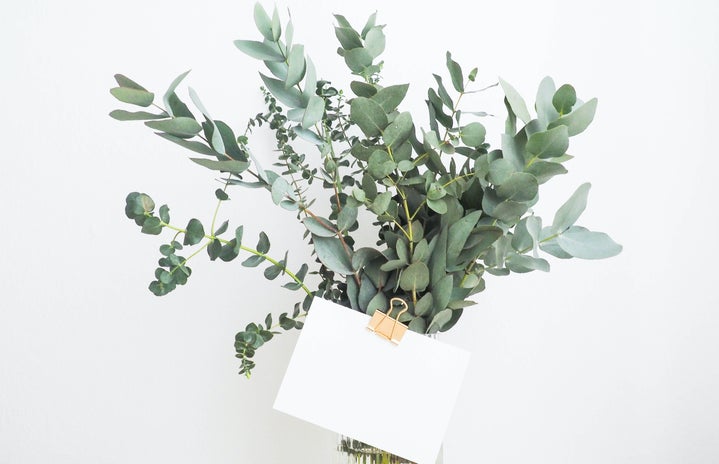There was pizza on the table. Colleagues stood around it, looking anxious and uncertain.
“I want some, but I just can’t.”
The comments poured in after the first joke, which was only a second in. The group was all women, and I was hungry. I picked up a plate and grabbed two slices before walking back to my desk to get back to making graphics.
This was only one specific internship—but it also wasn’t. It’s not like like this issue is industry-specific, or age-specific. It’s something I hear on an almost daily basis.
As an intersectional feminist and recovered anorexic, I fight hard to stop comments like these. But it really is hard.
Fatphobia scares me. If I’m being candid, I’m actually very skinny. I was built with a very small frame, identical to my mom’s. Size six shoes. Size four ring fingers. Five feet and two inches tall, if I tiptoe. I have thin privilege, and comments about weight are never directed at me. My physician has never suggested I “lose weight” as a solution for my physical disability or the things I’m unable to do because of it. Any health problems I’ve had have never been blamed on my weight. Even my Raynaud’s Syndrome, which has required me to be carried back from snowstorms because I lost all feeling in my feet, wasn’t blamed on my weight when I saw a doctor, even though the syndrome is most common in underweight women. I’ve never had a doctor ask me if I eat healthy or exercise. I think they just assume that I do.
I think it’s crucial to recognize both fatphobia and thin privilege and to speak out about these issues. It can be hard to do, because diet culture is so embedded in our society, especially for women. Even my feminist friends are guilty of making jokes about what they can’t eat, or saying to a friend, “You’re not fat, you’re beautiful!”—as if that friend couldn’t be both.
I’ve never been weight conscious because I’ve never had to be. My struggles with disordered eating mainly stemmed from a desire for control. But I began to pick up on diet culture and fatphobia regardless because the commentary now held my attention. When I made the conscious decision to change my relationship with food, my body and control, I also made the decision to notice where my thin privilege—and calling out fatphobia—come into play.
I don’t live the healthiest of lifestyles. If I had to categorize it, I’d say I follow the “Lorelai and Rory Gilmore diet” minus the coffee, red meat and fries. I still drink way too much soda every day. But no matter what I eat—and how deliberately I choose to eat it—I’m never the subject of scrutiny over what I’m ordering, simply because of my thin privilege.
I’m not here to tell all women that we need to adopt and reclaim “fat,” but many fat women have done just that, and I think that’s the movement we should all be a part of. Why is it that we jump to “fat” as an insult the minute we decide we don’t like another woman? Why is it okay to call someone “fat” if you don’t like them, but not okay if it’s a friend? How can we reassure our friends, “You’re not fat,” and then look in the mirror and say, “I’m fat,” in the same derogatory sense?
These are the steps I’m taking to combat fatphobia, and acknowledge my thin privilege.
I never tell people, “But skinny girls have it hard, too.”
Yes, I’ve been told to eat something. People have told me I’m too skinny. I’ve been told it hurts when I sit on people’s laps because I’m so bony. I’ve had men tell me that being this thin isn’t attractive (excuse me, as if I tailor my appearance for your benefit!).
But I don’t experience systemic oppression and discrimination for being thin. That’s just the truth. In our culture, we tend to demonize fatness and fat bodies. We sling the word like a slur. We think we have a right to tell people what to do with their bodies. We judge fat people for having a snack when we wouldn’t judge a thin person for the same snack.
If I hear people saying that thin people have it hard, too, I take the time to explain systemic discrimination to them, and I point out some examples of my own thin privilege.
I ask my friends how they’d like to be identified.
If someone wants to be called fat, I will call them that. If they don’t, I won’t. I really believe in respecting people’s individual identities, even when it comes to things that we, as a society, don’t always give individuals control over—like names, gender pronouns and disability identities.
I don’t use fat as a slur, even if people around me do.
I never called myself fat, to begin with, but now I make an active attempt not to use fat as an insult, even with people I dislike. The same way I wouldn’t call someone’s sexuality, gender identity, religion, race or disability in as an insult, I won’t use “fat” as an insult.
I also don’t use weight loss as a compliment.
Even if someone’s on a diet on purpose, I won’t compliment them on their weight loss. For one thing, I wouldn’t want them to think back negatively on that compliment if they ever regained any weight. I also don’t want my friends and family to think that losing weight is an inherently good or complimentary thing and that if you don’t lose weight or weigh a certain amount, you aren’t worthy of compliments.
I try to base most of my compliments for others not on their looks, although I do like to compliment people’s fashion choices and new hairstyles. If someone’s on a diet, I’ll ask them about any health benefits or differences they’ve noticed, and I’ll specifically compliment them on doing well and following their personal goals.
I don’t make assumptions about anyone’s health.
Nobody knows better than I do that looks can be deceiving. More than once while out eating with a friend, the waitstaff has given me the healthier of the two meals, having assumed it was mine. I never assume that someone is healthy or unhealthy because of their weight, or even what they’re eating at the current moment. To be honest, it’s really none of my business (or anyone else’s) how healthy or unhealthy someone else is.
If I hear those kinds of comments from other people, I try to politely shut them down and remind the person to focus on their own health instead of someone else’s.
I listen to what my friends and those around me have to say.
I don’t know what it’s like to live with fatphobia aimed at me. I don’t shut down my friends when they talk about what it’s like. Full stop.
I may not know what it’s like to experience fatphobia, but I always want fat acceptance included in my feminism.


